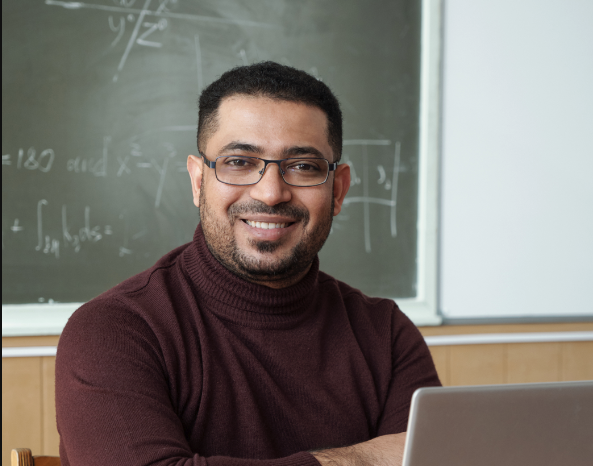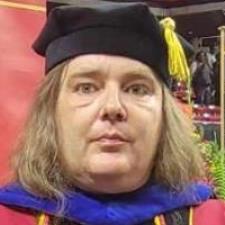











More than 4 million 5-star reviews
65,000 expert tutors in 300+ subjects
Find a great match with our Good Fit Guarantee
More than 4 million 5-star reviews
65,000 expert tutors in 300+ subjects
Find a great match with our Good Fit Guarantee
Featured by the nation’s most respected news sources
Tutors from top universities
Meet 1:1 at home or nearby
The Best Tutors in Ames, IA
Find the best local tutor in Ames

Ames, IA
Ph.D. Physicist + M.Eng., CS | Physics, Math, & Python Tutor
Hi! I’m Dr. Matthew — a PhD-trained physicist and computer scientist with 15+ years of teaching and tutoring experience. I specialize in helping students who feel frustrated, behind, or “not good at math” rebuild confidence and succeed...
Hi! I’m Dr. Matthew — a PhD-trained physicist and computer scientist with 15+ years of teaching and tutoring experience. I specialize in helping students who feel frustrated, behind, or “not good at math” rebuild confidence and succeed...

Near Ames, IA
Piano teacher who loves her job
The piano is such a responsive instrument, a pleasure to listen to and has so many varied uses! I've taught piano for a long time in person but have been doing it online for about four years. I play for church every Sunday; weddings,...
The piano is such a responsive instrument, a pleasure to listen to and has so many varied uses! I've taught piano for a long time in person but have been doing it online for about four years. I play for church every Sunday; weddings,...
Paula has been my daughter’s teacher for several years and she has been very easy to work with. She plans her lessons to fit my daughter’s skill level and adds challenges as needed. Great summary and feedback for each lesson. Over... - Mike, 94 lessons with Paula

Ames, IA
Tutor for voice & piano, handwriting & adult computer skills
Hi, my name is Susan Skye, and I would be happy to help you learn new things or improve skills you already possess! Currently I am available in the afternoons & evenings, Central time. I am limiting my subjects at this time to voice, piano...
Hi, my name is Susan Skye, and I would be happy to help you learn new things or improve skills you already possess! Currently I am available in the afternoons & evenings, Central time. I am limiting my subjects at this time to voice, piano...
Susan is a very kind and caring person. She works well with my grandson. He can be quiet challenging. She not only helps Cayden, she is a great advisor and support to me. - Leah, 41 lessons with Susan-Skye
Here are even more great tutors who offer online lessons.

CPA with Big 4 and Industry Accounting Experience Giving Back
As a CPA, I enjoy giving back to the profession with a below-market rate to provide CPA candidates and students with an affordable option for quality tutoring services in accounting, finance, and other business topics. My Big 4 experience,...
As a CPA, I enjoy giving back to the profession with a below-market rate to provide CPA candidates and students with an affordable option for quality tutoring services in accounting, finance, and other business topics. My Big 4 experience,...
Theresa is a very knowledgeable tutor in all 4 sections of the CPA exam. Theresa helped me pass each of the 4 parts of the CPA exam in one attempt within a 12 month window. She has a proven recipe for success in passing all 4 part... - Matt, 57 lessons with Theresa

Computer Science Professor for AP Computer Science A, DBMS & SQL, Java
I am Vijayalakshmi, but you can call me Viji. I am an adjunct computer science professor in a leading community college in Indiana. I completed my Masters of Computer Applications in 2005. I have 6 years of experience in online tutoring and 12...
I am Vijayalakshmi, but you can call me Viji. I am an adjunct computer science professor in a leading community college in Indiana. I completed my Masters of Computer Applications in 2005. I have 6 years of experience in online tutoring and 12...
Vijji is teaching computer science to my son. My son had to switch schools and he missed few concepts in his transition, Very happy to find Vijji and she is excellent and very knowledgeable. Definitely recommend students looking ... - Julia, 4 lessons with Vijayalakshmi

Expert Educator / Veteran Programmer helping learners Thrive & Achieve
Utterly lost in your class or project? Looking for your first job and build a successful career that you love? Want to build your first professional website? Or maybe just a real app that scales in the cloud? Or you just want someone you can read...
Utterly lost in your class or project? Looking for your first job and build a successful career that you love? Want to build your first professional website? Or maybe just a real app that scales in the cloud? Or you just want someone you can read...
Ben takes the time to understand how the student learns and changes his approach based on that. He is outstanding. - Paola, 6 lessons with Beaei

AP Biology Reader and Experienced Teacher Specializing in AP Biology
Hello! My name is Jon B. and I graduated from Palm Beach Atlantic University with a bachelor’s degree in biology and then continued my education with a master’s degree in microbiology from the University of Florida. I fully understand that...
Hello! My name is Jon B. and I graduated from Palm Beach Atlantic University with a bachelor’s degree in biology and then continued my education with a master’s degree in microbiology from the University of Florida. I fully understand that...
Jon is an excellent AP Bio tutor. My daughter is preparing for the AP Bio for this upcoming school year and Jon has been very helpful. Each session is very organized and starts with a quick review of the concepts that were taught ... - Mei, 45 lessons with Jon

Calculus, SAT, ACT, GRE Expert with B.S./M.S. in Math
I have been teaching mathematics for 20+ years and love what I do! Currently employed as a data scientist, I give math tutorials on my free time. I am a subject matter expert in the following: Algebra I, Algebra II, Geometry, Precalculus,...
I have been teaching mathematics for 20+ years and love what I do! Currently employed as a data scientist, I give math tutorials on my free time. I am a subject matter expert in the following: Algebra I, Algebra II, Geometry, Precalculus,...
My daughter has been tutored by Mr. Robin for more than 2 years. She is in 11th grade right now. We just got her SAT score yesterday (she took SAT in October). She got 100% correct in math part. She is currently taking AP calculus... - Karen, 88 lessons with Robin

BA Exercise Science; BA Kinesiology; ACSM CPT; 40+ Years in fitness
Hi, my name is Doug Warner. I graduated with a 4.0 GPA in Exercise Science and Kinesiology. I am a certified ACSM CPT I have spent 40 plus years in the industry. As a personal trainer the knowledge of anatomy, physiology, and nutrition are...
Hi, my name is Doug Warner. I graduated with a 4.0 GPA in Exercise Science and Kinesiology. I am a certified ACSM CPT I have spent 40 plus years in the industry. As a personal trainer the knowledge of anatomy, physiology, and nutrition are...

Summer Math Enrichment and Tutor (Elem. Math, Pre-Algebra, Algebra I)
I currently tutor students in Elementary math, from 1st to 6th grade, Prealgebra (Pre-Algebra) 7th-8th, and Algebra 1. When tutoring a child that is currently in grades kindergarten through 6th grade, I test the child's skills in the four...
I currently tutor students in Elementary math, from 1st to 6th grade, Prealgebra (Pre-Algebra) 7th-8th, and Algebra 1. When tutoring a child that is currently in grades kindergarten through 6th grade, I test the child's skills in the four...

Registered Securities Principal
I have a degree in Economics from Butler University. I graduated in 2011. Since that time, I have worked for a number of registered broker-dealer firms as well as SEC registered investment advisory firms. I currently hold six securities licenses....
I have a degree in Economics from Butler University. I graduated in 2011. Since that time, I have worked for a number of registered broker-dealer firms as well as SEC registered investment advisory firms. I currently hold six securities licenses....
Austin is very Knowledgeable. Passed the Series 7 with his help. Highly recommend. Went over the important areas of the exam. Thank you for everything you did to help me on my path! - Devan, 2 lessons with Austin

The Tutor I Always Wish I Had
I am a 99th percentile test taker who routinely helps students reach their fullest potential on a test and, in many cases, perform better than I ever have. The LSAT is a test that requires those who take it to think in a particular way. As...
I am a 99th percentile test taker who routinely helps students reach their fullest potential on a test and, in many cases, perform better than I ever have. The LSAT is a test that requires those who take it to think in a particular way. As...
Some rock solid numbers: from the mid 150s on my first practice test all the way to a score in the high 170s on the actual exam. I could not have achieved my score without Tim. Before starting our lessons, I had been studying for ... - Kristina, 37 lessons with Timothy

Writing, Reading, and Philosophy Tutor
Growing up, I had an interest in learning about the world. As a teenager, I discovered the richness and open-ended possibility contained in the field of philosophy, which studies large-scale questions that are often not covered in other subjects....
Growing up, I had an interest in learning about the world. As a teenager, I discovered the richness and open-ended possibility contained in the field of philosophy, which studies large-scale questions that are often not covered in other subjects....
I cannot express enough gratitude for the exceptional tutoring provided by Robert. His guidance has been instrumental in significantly improving my writing skills. With insightful feedback and detailed analysis, Robert has consist... - Lee, 63 lessons with Robert

Math and Physics tutor
Zach is a tutor with experience tutoring college students in integral and differential calculus and both calculus-based and algebra-based physics. He got his Bachelor of Science degree in 2011, majoring in Geology and double minoring in Physics...
Zach is a tutor with experience tutoring college students in integral and differential calculus and both calculus-based and algebra-based physics. He got his Bachelor of Science degree in 2011, majoring in Geology and double minoring in Physics...

Expert Tutor for Series 3, 7, 9, 10, 63, 65, 66 & Career Development
Hi there! I’m Jason, and I bring over 14 years of experience in the fast-paced financial industry along with a true passion for teaching. I graduated with a degree in Business from New York University’s Tandon School of Engineering and have...
Hi there! I’m Jason, and I bring over 14 years of experience in the fast-paced financial industry along with a true passion for teaching. I graduated with a degree in Business from New York University’s Tandon School of Engineering and have...
I recently passed my Series 7 and I am happy to give a lot of the credit to Jason. Let me start off by saying he is worth every single penny. I previously used other tutors through Wyzant and a lot of them have preset presentation... - Sean, 3 lessons with Jason

Patient and Enthusiastic English and Writing Tutor
Hi! I’m Dana, and I graduated magna cum laude from Hamilton College in 2024. My passion for language led me to get a BA with departmental honors in both Creative Writing and Classical Languages. I have been supporting other writers since high...
Hi! I’m Dana, and I graduated magna cum laude from Hamilton College in 2024. My passion for language led me to get a BA with departmental honors in both Creative Writing and Classical Languages. I have been supporting other writers since high...
Dana came prepared and provided the exact tutoring needed. She has experience and the technique to make the session worthwhile. Will definitely use Dana as our regular tutor. - Ian, 4 lessons with Dana

Perfect Score Geometry, Algebra 2, Precalc, Calculus & SAT Math Tutor
Ranked in the top 1% of Wyzant Tutors in 2018, 2019, 2020, 2021, 2022, 2023, 2024, and 2025 My name is Abbey, and I would love to be your tutor. I have been tutoring for over 15 years. I am a former MIT student, and I graduated from UAlbany...
Ranked in the top 1% of Wyzant Tutors in 2018, 2019, 2020, 2021, 2022, 2023, 2024, and 2025 My name is Abbey, and I would love to be your tutor. I have been tutoring for over 15 years. I am a former MIT student, and I graduated from UAlbany...
Abigail was phenomenal in preparing my son for the SAT math section. With just a handful of focused sessions the week before the test, she helped my son achieve a perfect 800 score. Abigail clearly knew how to identify key areas f... - Anna, 2 lessons with Abigail

Dr. Adam's tutoring for all things related to the human body
I've been an teacher, tutor, doctor, exercise physiologist, therapist and mentor for a long time. I strive to meet my student at their current level of mastery and guide them to greater understanding. There are many different ways to learn...
I've been an teacher, tutor, doctor, exercise physiologist, therapist and mentor for a long time. I strive to meet my student at their current level of mastery and guide them to greater understanding. There are many different ways to learn...
We reviewed Histology and he made it very learnable and understandable. He’s by far the best tutor I’ve ever had! I wish he was my actual instructor so I could learn my course material the way I do during our sessions. - Shannon, 5 lessons with Adam

Polish Language Teacher/Tutor
I am a native Polish speaker with over 10 years of experience teaching Polish language. I work with learners at all levels—from complete beginners to advanced—online, in person, and at major U.S. universities. I hold an MA in Foreign Language...
I am a native Polish speaker with over 10 years of experience teaching Polish language. I work with learners at all levels—from complete beginners to advanced—online, in person, and at major U.S. universities. I hold an MA in Foreign Language...

Yale, UCSF, Cornell & Columbia | Interview Prep: MD, PA, NP, Nursing
I help you stop sounding like an applicant and start sounding like a future colleague. QUICK FACTS: - YALE, UCSF, CORNELL & COLUMBIA | THE INSIDER EDGE: Get the perspective of an expert who has worked within the nation’s most elite medical...
I help you stop sounding like an applicant and start sounding like a future colleague. QUICK FACTS: - YALE, UCSF, CORNELL & COLUMBIA | THE INSIDER EDGE: Get the perspective of an expert who has worked within the nation’s most elite medical...
I cannot express enough how incredible my experience with Tyler was. From day one, he was incredibly supportive and motivating. His guidance helped me transform my answers from good to A+ quality, and he provided insightful feedba... - Bella, 13 lessons with Tyler

Patient and Fun Spanish/French tutor. Test prep, homework help, & more
Let's be honest...You are the captain of your ship. You have goals. Whether you realize them or not. Maybe your goal is to simply pass a test. Maybe you just want help with some homework. Maybe it's just to get through that dreaded Spanish/French...
Let's be honest...You are the captain of your ship. You have goals. Whether you realize them or not. Maybe your goal is to simply pass a test. Maybe you just want help with some homework. Maybe it's just to get through that dreaded Spanish/French...
I worked with Thaddeus to get through my Spanish 202 class, which was the last class I needed before I graduated. Safe to say I passed! It is absolutely all thanks to the fantastic help offered to me by having Thaddeus as my tutor... - Kori, 5 lessons with Thaddeus

Experienced AP and College Calculus and Physics Tutor
I have a passion for explaining math in a way that is easy to understand. I have been tutoring middle school, high school, and college math and science for about 15 years. I have a background in hydraulic engineering but am currently teaching high...
I have a passion for explaining math in a way that is easy to understand. I have been tutoring middle school, high school, and college math and science for about 15 years. I have a background in hydraulic engineering but am currently teaching high...
Jennifer is the BEST AP Physics and AP Calculus Tutor, hands down. She takes concepts that are very challenging and breaks them down into simple parts. She is patient, encouraging, and inspiring! I took AP Calculus B/C last year a... - Ross, 81 lessons with Jennifer

Transform Your Math with a Veteran Teacher, UC Berkeley Math BA
My work with students over the last 20 years helps me to pinpoint what students struggle with. I am able to address their math needs and patiently guide them to the next level. First, we break down what they need for their tests. Then I...
My work with students over the last 20 years helps me to pinpoint what students struggle with. I am able to address their math needs and patiently guide them to the next level. First, we break down what they need for their tests. Then I...
Ingrid has been an incredible help for my 7th grader in getting ahead in Algebra, and I couldn’t be happier that we found her. She took the time to thoroughly discuss my child’s needs and our goals, ensuring she was well-informed ... - Joyce, 31 lessons with Ingrid

Creating lifelong learners, Grades K-6
Hi, I would LOVE the opportunity to work with your child! I am passionate about education and the importance of children developing a life long love of learning and the ability to learn independently. I recently retired from a 30 year teaching...
Hi, I would LOVE the opportunity to work with your child! I am passionate about education and the importance of children developing a life long love of learning and the ability to learn independently. I recently retired from a 30 year teaching...
Beth did a great job at assessing my son's reading strengths and weaknesses. She now has a game plan to work with. My son enjoys her pleasant and patient demeanor. - Michelle, 45 lessons with Beth

Certified Chemistry Teacher and Top Ranked Tutor
Hello, my name is Gaby! I am a graduate from the University of California, Riverside where I received my Master’s in Education and my Chemistry Teaching Credential. My background: I have 5+ years’ experience tutoring in Organic Chemistry. I...
Hello, my name is Gaby! I am a graduate from the University of California, Riverside where I received my Master’s in Education and my Chemistry Teaching Credential. My background: I have 5+ years’ experience tutoring in Organic Chemistry. I...
Ames Tutors Cost $35 - 65 per hour on average
What’s a fair price for a private Ames tutor? Ames tutors using Wyzant are professional subject experts who set their own price based on their demand and skill.
Compare tutor costs. With a range of price options, there’s a tutor for every budget.
Sign up, search, and message with expert tutors free of charge.
Only pay for the time you need. Whether it’s one lesson or seven, you decide what to spend.
Love Your Lesson Or It’s Free
Your first hour with a new tutor is protected by Wyzant’s Good Fit Guarantee. If you’re not satisfied with your lesson, you don’t pay. No questions asked.Reported on by leading news outlets



Tutors in Ames, IA
Wyzant in Ames, IA connects students with expert tutors across a range of subjects. Browse local and online tutoring options to support learning at any level. Our platform makes it easy to find personalized, affordable tutoring that fits your schedule.
Whether you’re working on math, science, reading, writing, or preparing for exams, tutors can help clarify concepts, improve skills, and build confidence. Wyzant’s flexible tutoring options include in-person lessons in Ames and remote sessions, making learning accessible and convenient.
Wyzant tutors support students of all ages and levels by providing tailored guidance that encourages progress and success. Connect today to discover a tutor experienced in helping learners in Ames achieve their academic goals.
A nationwide network
Private Tutors in Ames
Your Ames private tutoring options may be numerous, but don't you want to take 1 on 1 lessons with the very best tutors in Ames? We have the largest network of qualified private tutors, so students can choose their ideal tutor (and rates) from the best of the best. With Wyzant, you can find local tutors for over 250 subjects, including:
Ames Physics Tutors | Ames SAT Tutors | Ames Grammar Tutors | Ames ACT Tutors | Ames Computer Tutors | Ames Precalculus Tutors | Ames Organic Chemistry Tutors | Ames Anatomy Tutors | Ames Language Tutors | Ames Spanish Tutors | Ames ESL/ESOL Tutors | Ames Science Tutors | Ames 3rd Grade Tutors | Ames Geometry Tutors | Ames GRE Tutors | Ames Writing Tutors | Ames 6th Grade Tutors | Ames American History Tutors | Ames 5th Grade Tutors | Ames Prealgebra Tutors | Ames 1st Grade Tutors | Ames Reading Tutors | Ames Kindergarten Tutors | Ames Elementary Math Tutors
Tutoring Near Ames
If you don’t live in the center of Ames, we do have local tutors in areas that may be closer to you, conveniently available for private 1:1 lessons at attractive rates. Compare reviews and qualifications and reach out to a tutor in your metro ASAP.
Des Moines Tutors | West Des Moines Tutors | Ankeny Tutors | Urbandale Tutors | Grimes Tutors | Waukee Tutors | Indianola Tutors | Bondurant Tutors | Slater Tutors | Johnston Tutors
Find Private Lessons Near Your Local School
Learn where you live. Find tutoring that is close to the classroom or campus that matters to you. Compare pricing and read thousands of reviews from students and parents like you. Make the grade when you hire a personal tutor on Wyzant’s marketplace.
Find online tutors
Get help anytime! We only accept the best online tutors into our community. Get the help you need, right when you need it with the convenience of online lessons.

